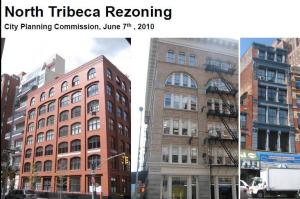REBNY Attacks City’s Plan to Limit Hampton Inns in Tribeca
By Eliot Brown August 11, 2010 8:58 pm
reprints The Bloomberg administration’s plan to limit the spread of hotels in north Tribeca is drawing fire from the real estate industry.
The Bloomberg administration’s plan to limit the spread of hotels in north Tribeca is drawing fire from the real estate industry.
The Real Estate Board of New York, the industry’s chief advocacy group, today put out testimony rather critical of a new special provision for hotels contained within the planned North Tribeca rezoning, calling it “disturbing precedent.” The provision, pushed by the hotel union and agreed to by the Bloomberg administration in the context of the 2009 mayoral campaign, would require any new hotel of 100 rooms or more planned within the district to need a “special permit,” and undergo extra layers of approvals. From the hotel union’s perspective, this is a way to get the City Council to have oversight over any new hotel development, and the labor-friendly Council would presumably work to block new hotels unless they have union-friendly hiring practices. (For background on this, I wrote a story a couple of months back about the Bloomberg administration’s union-urged war on limited-service hotels.)
REBNY, which would tend to prefer a world with no development restrictions, is less than happy about this.
“We believe that this limitation on transient hotels does not have a sound basis in planning theory or history, and places an unwarranted burden on a desirable and compatible use,” the group wrote in its testimony submitted today.
More from the testimony:
[T]he additional discretionary review for hotels mandated by the Rezoning appears to serve a political rationale: to create the opportunity for City Council review, and thus for City Council negotiations, for what would be an as-of-right use in any other C6-2 district (and any other M1-5 district) in the City.…
This use of the special permit mechanism creates a disturbing precedent for the administration of the City’s Zoning Resolution, where uses that are generally compatible are channeled into an administrative review process rather than allowing them on an as-of-right basis. It is important to preserve the City’s as-of-right zoning in order to protect the predictability of zoning administration; to undermine this predictability for no clear reason does not make sense to us.
And while this is a development-restrictive policy that would not ordinarily seem to enjoy the support of the Bloomberg administration (it was the hotel union’s idea, after all), there is at least some policy rationale. Hotels tend to have far more traffic coming and going than, say, an apartment building, and thus might make the neighborhood busier and less welcoming than desired. Thus, by this rationale, there should be another layer of review (the same as for parking garages) by the City Planning Commission and the City Council.
Still, this is a new precedent, and, accordingly, opens up the door for more of these to come.



